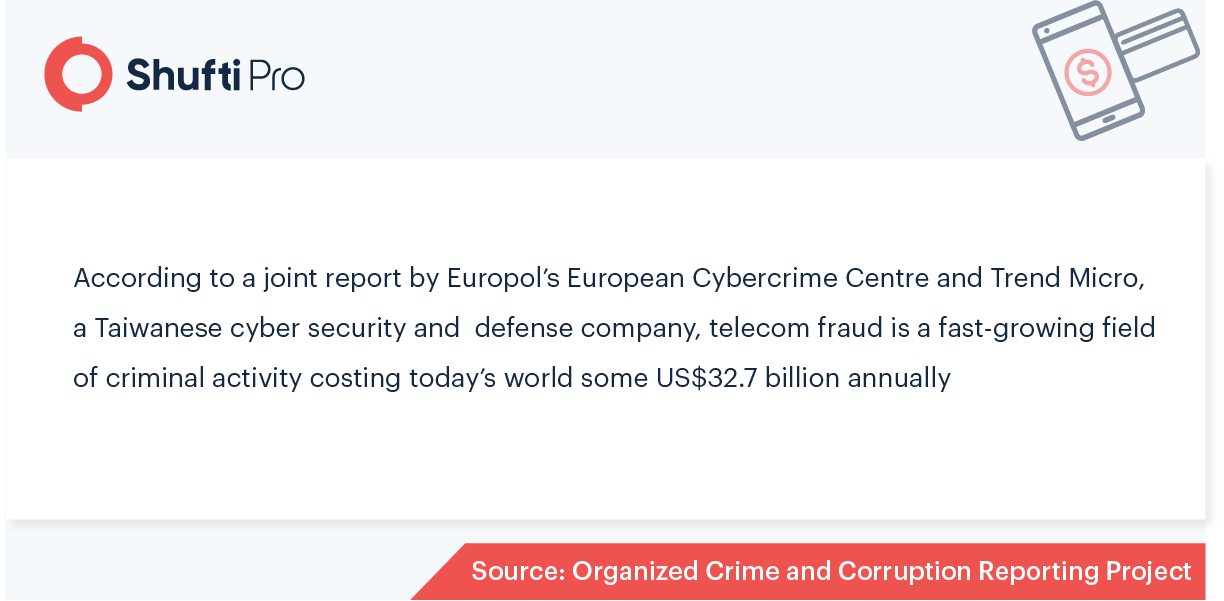
Fraud Detection, Compliance, and ID Verification Solution to Secure the Telecom Industry



BEFORE YOU GO...
Check how Shufti Pro can verify your customers within seconds
Request DemoNo thanks
The telecommunication industry has played a crucial role in global digitization, innovation, and growth. During the coronavirus outbreak, telecom businesses became much more apparent. Due to travel restrictions, social distancing, and work from home norms, telecom service providers replaced physical interaction with digital means. The sector is efforting to transform conventional approaches of meetings, aiding companies to stay functional in today’s uncertain environment. Despite the innovation, this industry has also become the foremost target of cybercriminals.
Due to this reason, identity verification has become a significant service to secure the telecom industry from the surging number of scams. As these services are directly or indirectly interlinked with other sectors such as medicare, government, and financial firms, ID verification matters the most in this industry. A total of $32.7 billion was lost in telecommunication fraud during the pandemic period. However, the rising crimes can be controlled and the industry can be secured through automated identity verification systems.
The telecommunication sector holds high fraud risk. Sim jacking, account takeover, phishing/vishing, and numerous other scams are becoming global issues. From individuals to international communication platforms like WhatsApp and Twitter, experienced hacks, databases compromised and data swiped. However, fintech companies are determined to back telecom businesses to enhance security measures through identity verification systems. Following are some of telecommunication industry’s fraud cases;
The UK’s National Crime Agency (NCA) has arrested the members of a famous organized crime group called “Chucking Squad”, which has scammed celebrities and other individuals through social media platforms using SIM swapping fraud. The NCA stated that they had arrested an additional eight individuals for related offenses. London Metropolitan police have accused one entity of stealing over $1 million cryptocurrencies through sim jacking. The same group was also directly linked to the hijacking case of Twitter’s CEO Jack Dorsey’s account back in 2019. However, the suspects were arrested in 2020. In addition to this, NCA has collaborated with homeland security, the FBI, US Secret Services, and other law enforcement authorities to detect and eliminate sim swappers.
Cybercriminals are exploiting the caring Britain parents through their children in order to take over other banks’ accounts. The fraudster usually presents as kids and sends messages seeking financial help. Messages like “hello mom” or “hello dad” are circulating in the country. Due to these messages, the parents get into fraudsters’ tricks and end up sending money to the criminals’ accounts. In addition to this, to make the whole scam more real, criminals build up stories like daughter or son’s mobile got lost, the reason behind changing numbers. Other than this, scammers also say that the kid is unable to access online banking, and provide an alternative account. Thus, the caring parents end up sending thousands of dollars to criminals.
The SIM swap scam has been occurring for decades in South Africa according to the South African Banking Risk Information Center (SABRIC). In recent years, sim swap fraud has grown to 91% as compared to online financial crimes. However, through the regulatory bodies’ investigations, it concluded that the mobile network operators (MNOs) develop strategies and procedures to verify customers that request sim swaps. This will eliminate the risk of criminals trying to manipulate the mobile operators, to swap sims from synthetic identities.

The US telecommunication industry is regulated at the federal level under the Communication Act 1934, as amended in the previous Act. This provides a national legal framework for regulating telecom services as well as mobile service providers. The Communication Act also allows the FCC to develop new rules, policies, and guidelines for telecommunication services. However, the services are regulated by individual states and localities, although the Communication Act gives FCC rights to preempt local or state laws under certain situations.
Areas of regulation may include;
The Communication Act 2003, is a replacement for the Telecommunication Act 1984. This is an essential law that sets up the Office of Communications (Ofcom) as the regulatory authority to govern the communication industry. This firm implemented the new EU regulatory framework in the UK, which came into effect in July 2003. Instead of providing licenses according to the Telecommunication Act, the new bill regulates mobile service providers by means of the general authorization according to the conditions of the market in which they are operating. However, Section 51 of this ACT defines the set of laws included by Ofcom in the general conditions. Section 51(1)(c) specifies “conditions making such provision as OFCOM consider appropriate for securing the proper and effective functioning of public electronic communications networks” and thus permits Ofcom to impose Article 23 of the Universal Service Directive, entitled as the integrity of the network.
The global regulatory bodies have come up with several regulations, with the objective of securing the telecommunication industry. As the number of frauds is increasing, the situation is getting alarming for the businesses as well as the regulatory authorities. It’s the social responsibility of the telecom industry to comply with the regulatory obligations. However, neglecting laws can put telecom businesses into serious problems including sanctions, hefty fines, and permanent bans. Following are the FCC non-compliance consequences:
Shufti Pro’s state-of-the-art identity verification services are an ideal option for the telecommunication industry as it allows businesses to determine real identities before onboarding customers. AI-powered ID verification solution with document validating services authenticates documents with 98.67% accuracy in less than a second. In addition to this, the telecommunication service providers can also make risk assessment reports of high potential risk clients.
The telecommunication industry and mobile service providers are finding it hard to fight reverse engineered fraud or onboard legit customers. Due to this, clients’ digital wallets and bank accounts get compromised. Thus, the reputation and image of the industry is damaging. Therefore, MNOs need to incorporate online identity verification systems that will help them out to maximize customer experience as well as becoming trustworthy.
Want to know more about Identity verification services for the telecom industry? Connect to us!